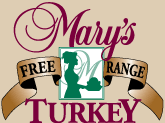 |
|||||||||
 |
|||||||||
 |
|||||||||
 |
|||||||||
|
|
|||||||||
 |
|||||||||
 |
|||||||||
|
|
|||||||||
|
|
|||||||||
|
|
|||||||||
|
|
|||||||||
|
|
|||||||||
|
|
|||||||||
|
|
|||||||||
|
|
|||||||||
|
|
|||||||||
|
|
|||||||||
|
|||||||||
 |
|||||||||
 |
|||||||||
|
|
|
|
Turkey Farmers Build a Better BirdDemand for heritage, organic, and free-range turkeys has grown recently due to health-conscious consumers who trust small, family farmsWith annual sales of 1.4 billion pounds of turkey totaling $1.5 billion, Carolina Turkeys' Butterball, the best selling turkey brand in the U.S. for more than 40 years, won't be losing its spot on most American tables any time soon. Still, it's worth noting the underserved market for alternatives to mass-produced turkeys. Farmers like Mary Pitman of Mary's Free-Range Turkey and other independent farms across the country say they are struggling to keep up with the demand for heritage, organic, and free-range turkeys that they and their customers believe are healthier than the birds available at most supermarkets. A spokesperson for the American Livestock Breeds Conservatory estimates heritage turkeys account for about 5% of today's total turkey market and that the number of heritage turkeys kept alive for breeding increased by 220% between 1997 and 2003. The Organic Trade Assn. estimates that the organic poultry market was worth $161 million in 2005, up 53% from 2004. True Blue BirdsAnd more and more organizations such as Slow Food USA (www.slowfoodusa.org), and Heritage Foods USA help source heritage turkeys through independent farmers, part of a movement that began in 2001 to reintroduce the turkeys to U.S. consumers. Heritage turkeys, which are admired for their colorful feathers and their strong legs and wings, can actually fly. Although all turkeys originated in the Americas, heritage birds have darker, more succulent meat than the supermarket variety which most people eat at Thanksgiving, and which have been bred to produce large breasts more in line with European tastes (see BusinessWeek.com, 11/22/04, "Not Your Mom's Holiday Turkey"). Independent farmers are finding that the number of consumers who are willing to spend more on their holiday birds is growing, and the business is proving to be lucrative. A 2003 article in the Rodale Institute's The New Farm urged farmers to consider raising heritage turkeys, citing the significantly higher prices that heritage turkeys fetch at retail compared with mass-produced birds. Long-Term RelationshipPitman agrees with the idea that real business opportunities exist in turkey farming. She says demand for antibiotic-free turkeys like hers has grown overwhelmingly over the past few years because of consumers who trust their health more to small family farms than to corporations. "We have a niche market, because we try to have something that the big companies aren't going to mass produce," she says. In addition to her 75,000 standard free-range turkeys and 20,000 organic turkeys, Pitman's Fresno (Calif.)-based Mary's Free-Range Turkey raised 5,000 heritage turkeys this season. Weeks before Thanksgiving, Pitman had sold all of her birds to stores. Whereas the average Butterball turkey costs about $1 per pound, Pitman's heritage turkeys run between $4 and $6 per pound. She attributes this extra cost to the fact that heritage turkeys usually take between six to seven months to reach market weight, as opposed to two months for mass-produced turkeys. Nice Guys"Any small farm has got to find niches to survive," says George Purtill, who expects to sell all of his Connecticut farm's organic turkeys within days. "You cannot compete with people who have thousands of acres and can buy feed, fertilizer, and seed in train-car loads." Michigan farmer John Harnois doubled the number of heritage turkeys he raised last year for this holiday season and increased his price to $10 per pound, but calls his financial situation "tenuous" and his growth merely "steady." He tries to keep up with the rapid rise in demand, but says "I raise wonderful food, but I hate selling it. I take a 'no' personally." MacMillan is a reporter at BusinessWeek.com in New York.
Courtesy of Steve Collins Mary PitmanMary's Free-Range Turkey |


